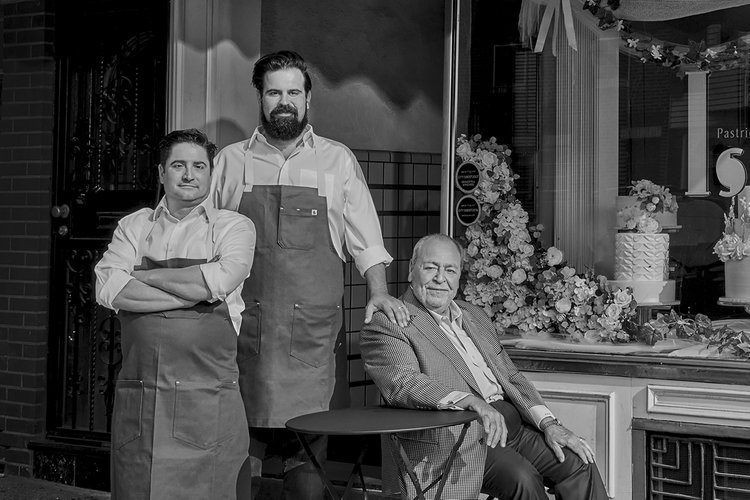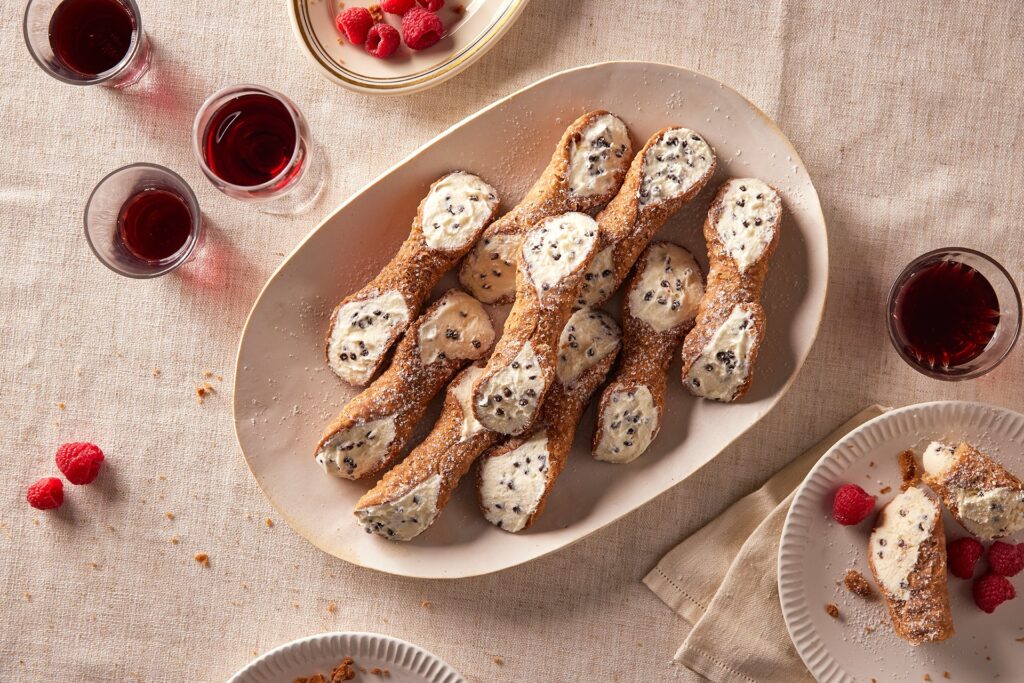Four generations, over one hundred years, making thousands of smiles!
We recently sat down with AJ Sarno of Isgro’s Bakery to discuss the history behind this amazing business and why they trust Arctic to keep their pastries fresh all year long. A slightly edited transcript of the conversation can be found below.
Let’s jump right in. Why don’t we just start with the history and the story of Isgro’s Bakery, and we’ll kind of go from there.
AJ: I’m fourth generation Isgro along with my brother Michael. My great grandfather Mario Isgro emigrated over from Sicily, specifically a small, small town outside of Palermo called Barcelona. Everybody thinks it’s Barcelona in Spain, but there is a Barcelona in Sicily as well. As a kid, he worked on a farm for a land baron, and he took to the kitchen. As the story goes, he would sit in the window of the kitchen and watch the chefs cook for the baron and their guests and family. The chef noticed him, brought him in and had him start doing odds and ends stuff. He really took to it! The chef noticed that, so the chef sent him off to Vienna, Austria, to get classically trained. When he got a little older, after he spent a couple of years in Vienna learning the trade, he came back to Sicily, worked on the farm, was the head chef on the farm, and took over from his mentor. Around this time in Sicily, there was a lot of unrest, civil war, and struggles. So he came to America, landed here in Philadelphia and round the corner was “Palumbo’s”. It was a halfway house for Italian immigrants and he stayed there for a while, until he got on his feet. He did odds and ends jobs until he built up enough money and bought the building at 1009 Christian Street that we still operate out of today. He brought all the recipes from Sicily, the cannoli recipe, the Italian rum cake recipe. A lot of his recipes, the old-world stuff is his and have NOT been changed in 118 years.
Such an amazing story, the American Dream!
AJ: He came here, he set up the bakery, got himself established, made a name for himself, and started making money. Then, as most immigrants do, he sent for the rest of his family, his wife, his brother, and I think a cousin or two, they all came here, and worked in the bakery. A couple of them went off and did their own things. He stayed here, established his family and second generation of my grandmother (Mary), her two brothers (Vito and Sam) and just passed on his teachings. He would do ice carvings for weddings as you had to be a jack of all trades to survive and get by to make a living. His expertise was in pastries and baking beautiful, elaborate wedding cakes. This was passed on to my grandmother, and then the second generation, and then the third generation. My father, Gus, and his brother, my uncle, went on to do other things. I wasn’t really interested in baking, but my dad really took a liking to it. My great grandfather noticed that my dad had a knack for it and taught him all the recipes.
Being Sicilian, he would only teach him recipes at night when it was just the family around. After my dad would come home from school, my great grandfather would slap him on the back of the head and said, “come on downstairs, we’re going to make whatever”. My dad took to it and loved it. That brings us to my brother who is 12 years older, he did it the right way. He worked here from when he was a kid, went through high school and college. He would actually end up leaving college to attend culinary school where his passion really was and worked here the whole time. He’s been working here ever since. I kind of got into this backwards. I went to school, as I always wanted to be a doctor. I went to a Saint Joe’s here in the city, obtained a biology degree and I went to Drexel University where I got my master’s degree in biology.
AJ, I love how you just fly over this. I just think it’s amazing. So humble and matter of fact? It’s just such a neat character trait, such a great endorsement of what’s in the DNA of the family and the business.
AJ: I appreciate those kind words. I do gloss over it because it’s not important to me now. Back then, it was, but it was a couple of years in my life that I just kind of glossed over because what I’m doing now is so much more important to me. Those two degrees are nice to look at and they’re tucked behind a couch in my basement. So, after I got my master’s degree, I was kind of figuring out what I wanted to do. Medical school, PA school. I got trained to be an EMT. I don’t know if I told you that, too? I threw that on the top as well, just to kind of bolster the resume for medical school or whatever I was doing. While I was figuring it out; I was at home and my mom and dad were like, “Well, you’re just not going to sit at home. You’re going to go into the bakery and help.” I had in the past, when I was younger as a kid growing up, elementary school, high school, I would work over the summertime holidays, but I never had an appreciation for it. I was doing low-level work. I was washing pots and pans, sweeping, mopping the floor. So, I didn’t appreciate what the work was. Years later, when I came back, after I got my master’s and started to work again, that’s when I began to appreciate the business. I did use a little bit of my degree, if you will, because baking is a lot of chemistry, believe me!
There’s a lot of chemistry, right?
AJ: I understood how to read my dad’s recipes. We have a recipe book and everything’s in my dad’s handwriting and he’s very cryptic. You know, going back to the Sicilian thing of not trusting anybody. Everybody can look at it, but certain people know exactly how to make certain things. He would leave ingredients out when he showed me ingredients and he would tell me, “look I left that out”. So, if someone else tries to make this recipe it’s not going to come out the way we make it. I understand what you’re doing, but you might be shooting yourself in the foot if somebody must make this someday or not. It’s one of those quirky things. Once I started learning the recipes and getting involved, I wouldn’t say I had an epiphany, but yes, like a light bulb went off in my head. I am here with my family or with people that you’ve known your whole life.
We don’t have a lot of turnover and the people that work here have worked with us for a very long time. My manager, Vince, he’s been here 40 years.He started here when he was 14, and turns 60 in two years. My head baker has been here 20 years, my head wedding decorator 25 years. My manager upstairs, Denise, has been here almost 20 years. She’s like my second mother. So, there was a comfort zone that I had here when I was figuring out what I wanted to do with my life. I hadn’t fully committed yet, but I was still living at home. I was sitting on the couch, and I was watching TV and my Dad turns to me, and he goes, “What do you actually want to do?” It’s like, damn, you got me dad and I really like what I’m doing. I love working at the bakery and he never pushed me towards it? He wanted me to do what I wanted to do and he loved the fact that I was pursuing a career as a doctor. I think all parents want better for their kids. They want their kids to be a doctor or a lawyer or whatnot. But when I said that I wanted to work at the bakery, I could see the smile. It chokes me up everytime time I talk about it too. To see him that happy was reaffirming to me that I was making the right choice. The conversation with my mom was a little bit different, because, you know; she wanted me to be a doctor.
Where do you kind of see this going? Are you guys going to do multiple locations? What’s your vision?
AJ: So right now, we still operate out of the basement. To grow the business properly, what we’re looking for is an actual commissary kitchen, something that’s properly ventilated, climate-controlled equipment. A lot of the equipment I have is older than all of us combined. My mixer is like 50 years old. They work, they’re great but, you know, it’s not enough. The business is growing so much that I need to give it a facelift and get us out of the basement into conditions and an environment with equipment that is fitting for putting out even better products than I can right now. So, what we’re looking at right now is production space and then from that off to possibly other retail stores.
In and of itself, it kind of scares me because I can’t be in multiple places at once. Yes, I do have my brother, but we’ve only had one store for 119 years because quality is so important to us and putting it in somebody else’s hands is scary. We’ve expanded a little bit as we wholesale to certain handpicked clients. DiBruno Brothers, certain restaurants that I have developed a relationship with and that also care about quality in their own name. The DiBruno Brothers are 105 years old as another South Philly Italian market staple. Growing the business, but maintaining the quality is the goal. I say this in the humblest way possible; more people should try my product. I think we make a great product consistently and I think more people need to try it and it’s scaling up slowly. We are taking baby steps, doing the right things, testing, and maintaining quality and expanding slowly to a broader clientele.
I imagine part of that quality comes from the partners you work with, not just from a wholesale standpoint, but the equipment manufacturers that you use inside as well.
AJ: Indeed, it does.
How did the relationship with Arctic come about?
AJ: I say quality recognizes quality. I reach for the pinnacle of whether it be ingredients, labor, or equipment. I need the best of the best, to put out the best. So when I look for equipment, I look for quality, something that’s going to last, something that’s going to do its job day in, day out, repeated to infinity, because we test equipment, our longevity, it tests equipment. I have nothing but the utmost respect and pride in Arctic. The Arctic crew puts out a fantastic product and our Arctic Rep, Michael Stempkowski has been phenomenal since day one. I don’t know if I’ll ever buy a different cooler / freezer unit other than an Arctic box.
There’s a personality behind it and you don’t feel like you’re just a number in the system or a cog in the machine. I operate my business in that same respect. When I take on a new client or a new customer, a new wholesale opportunity, they get my phone number because at the end of the day, it’s my product, it’s my name, it’s my reputation that’s on the line. If there’s a problem, if there’s an issue, I must be the one that solves it. I stand behind my product 100%, and that’s the feeling and that’s the way I’ve seen that our tech runs their business as well. Like I said, quality recognizes quality, and there’s no shortage of quality from an Arctic box!
You mentioned the family history. What else do you think is in the DNA of the company that’s allowed it to last this long?
AJ: I think that customer service, that family feel that when you walk in the door, everybody that works here is trained to treat everybody that walks through that door like they’re their own grandmother or their own mother or their brother. I want you to feel like your family when you come here. You know what we have seen over the years because we’ve been in business so long, is we get generational customers.
Parents bring their kids and then the grandparents bring their grandkids. We’ve seen it so many times. I’ve had somebody come in and I just happened to be in the store because I don’t necessarily work in the store, but I like to pop my head in the store, look around, make sure everything looks right, and I’ll stop and I’ll chat and, oh, you made my mother’s cake. You made our wedding cake, too. We’ve been getting rum cakes for you for every birthday for 40 years. I hear it often, and it’s crazy. It’s one of those things, it brings you back to reality, because when you’re in it, when I’m working here every day, I’m not thinking about the magnitude of what I do for people. I’m not a doctor, but I like to say that I bring happiness, we supply happiness and memories. That birthday cake that you had with you sitting around the table with your family, the Christmas holiday dinners year after year, at the end of the night, you have a couple of cannoli and a few pastries on the tables.
It’s hearing these stories of people as they come through my doors for generations and the way that we treat them. It’s not like you can put out a great quality product that’s fine and you’ll get customers, you know, once or twice coming back. It’s the experience and the feeling. I believe that’s the warmth and that family feeling that really spreads from being a one generation to a multi-generational product.
What’s in the next three years? There’s going to be a critical mass to where you’re going to have to change something that could be, from an infrastructure perspective quite frightening. And how do you feel about that?
AJ: I believe it is staying within your limitations, and we do it now. I turn down business left and right by choice. I know I can make more of a product at the same quality to a certain point and a lot of that is dependent upon the environment. I can buy the best ingredients, but I can’t walk into a grocery store or a restaurant and simply pick off a great manager or a great salesperson.
It sounds like you operate with a business philosophy, and that determines the plan?
AJ: Exactly. The philosophy comes first, and the plan must always suit that. The plan must change to meet the philosophy.
Any big events coming up, whether they’re employee driven or anything?
AJ: We have been here for so long. We’re such we’re so ingrained in the community we get schools will oftentimes ask us, “Hey, look, we’re doing a cookie drive; can you donate?” Of course, we can. The church, St Paul’s, where I got married down the street; we’re very involved in anything they need. They need the cake for whatever fundraiser they’re doing. Sure. Absolutely!
That’s great. It’s safe to say that you know when the community is in there, you’re there. Right.
AJ: They’ve supported us for 118 years. It’s our duty to support them back.
If you had to sum it up in two sentences, if you were just going to do an elevator speech on what the organization is, what it stands for, core values, how would you do that?
AJ: The culture that’s here, the workplace environment, the fact that we haven’t had turnover, the level that Isgro’s was even before I took over; it has a lot to do with my dad. I’m going to break- up when I say this. I think it’s perfect and I approach everything with, (what would Dad do? How would Dad approach this situation?) Thankfully, he’s still here and I call him, talk to him every day. He calls me like nine times a day, because he’s always watching. Everybody that worked here, you don’t have people working for you for 40 some years if you’re not a good person, you don’t have clients that have been coming to you for generations if you’re not good people, if you don’t treat people with respect, dignity, and kindness. Dad;s devotion to the quality of his name and his family’s name, my family’s name!
I think you just nailed it. Thank you, AJ!
AJ: Thank you.





